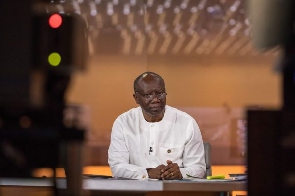 Finance Minister, Ken Ofori-Atta
Finance Minister, Ken Ofori-Atta
Growing debt levels appears to be choking many African countries, a situation exacerbated by the COVID-19 pandemic.
To this end, the African Development Bank (AfDB) is urging governments across the continent to use monies borrowed from the international community to undertake productive ventures that will pay back, as the pandemic-induced debts are likely to plunge many countries into distress.
As the pandemic began taking a toll on countries, many countries on the continent chose to run to international financial bodies such World Bank, the International Monetary Fund, and the AfDB for financial assistance to close the yawning fiscal gap created by the pandemic’s impact.
An AfDB report dubbed: ‘West Africa’s Economic Outlook’ indicated that some countries, including Ghana, were already considered debt distressed before the outbreak of COVID-19. Their cases were worsened with COVID-19 as governments had to cough up resources to tackle the threat of the virus on people and the economy.
Health systems had to be resourced and health workers and other frontline staff incentivized, poor and the vulnerable groups needed to be provided with food during the lockdown and border closures blocked revenue mobilization among a host of other issues.
All these were unbudgeted expenditures for governments on the continent which have consequently widened fiscal deficit gaps. It’s against this backdrop that the AfDB is advising that monies borrowed to take care of these unbudgeted expenditures should go into productive ventures, in order to pay back and close the yawning fiscal gaps created.
“Development partners should proactively engage with the authorities at national and regional level in designing appropriate financing packages that recognize the limited fiscal space obtaining in the region”, the report further indicated.
Many African countries were already on the verge of looming debt crisis due to build-up of high levels of borrowing domestically and internationally. The crisis will affect Africa’s growth through domestic and external channels, with a significant impact on the well-being and number of people living in poverty.
The most recent forecasts project a GDP contraction in most countries in 2020, the first in 25 years. African policy makers and their partners should re-assess the trade-offs between short, medium, and long-term priorities.
Most African countries lack the fiscal space and capacity to adopt robust short-run stimulus measures, or are constrained by monetary arrangements that prevent them from implementing national strategies.
Policies for regional integration and productive transformation of African economies should be prioritized in the medium- to long-term to reduce the continent’s vulnerability to negative external shocks.
Firmer measures required for survival
With the latest figures published by the Ghana Health Service (GHS) revealing a more than 2,200% spike in the number of confirmed cases of COVID-19 in the twelve weeks since the ending of the lockdown in parts of the country, its increasingly disheartening to observe the manner in which safety protocols are disregarded with reckless abandon.
Whilst we should be thankful that the mortality rate in our nation is significantly low, relative to other nations, the worst form of unrestrained indiscipline is constantly on display. There seems to be the growing sentiment that all the warnings were much ado about nothing; that health authorities had cried wolf and made it seem as though the end of the world was upon us.
Nothing could be further from the truth! Even a cursory look at the rate of spread, the crippling of businesses, the lack of productivity from many within the labour force, the further complications recorded by those who have recovered and have been discharged, the rising death toll, the possibility of a second wave and the mutation of the virus (as history has shown us) should make us realize the scale of the challenge we are faced with.
It is in line with this that the President, via the Executive Instrument (E.I 164), stipulated punishments of prison sentences of four to ten years or a fine of GHc12,000 to GHc60,000, or both, for non-compliance with safety protocols, especial, the non-wearing of prescribed facemasks in public.
Sadly, some sections of the public seem to consider the punishments stipulated under E.I. 164 to be draconian and excessive. Some have argued that the government cannot realistically impose a fine of GHc60, 000 or afford to increase the prison population at such a time as this, especially with general elections only months away.
Every society needs checks and balances for its survival; not just threats of these but actual implementation. It is incumbent upon each and every one of us to treat this as a global, national, human and personal threat.
Perhaps, we might have to implement the ‘less draconian’ measures such as naming-and-shaming, the issuance of spot fines, and punitive community service measures such as garbage collection and similar sanitary engagements to curb the flagrant disregard for Covid-19 public health safety protocols.